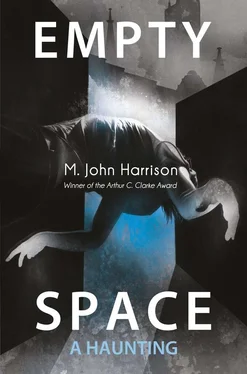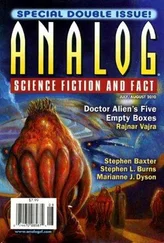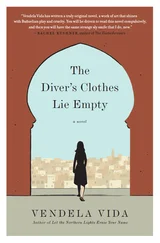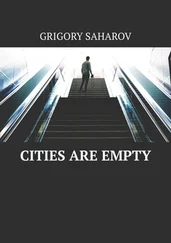It was perhaps two inches by three, with curved, organic-looking edges, its smooth dull surface interrupted at one end by a line of firewire ports — one of those objects which, new and exciting in its day, now looked as dated as a cigarette case. Michael had left it with her, along with some instructions, putting his warm hand over Anna’s — they were in a railway café just like this one — and urging her:
‘You will remember, won’t you?’
All she could remember now was being afraid. When you’re afraid of everything, especially each other, you have to walk away; consign each other to the world.
Anna had arrived in Norbiton between trains. She drank a second cup of tea and stared out with vague good will at the empty platform, where everything had a thick fresh coat of paint. After about twenty minutes an old man was helped into the café by some railway staff. He had outlived himself. His bald brown head seemed too big for his neck; his underlip, the colour of uncooked liver, drooped in exhausted surprise at finding himself still there. They sat him at Anna’s table, where he banged her feet and legs about with his stick, shoved the contents of her bag carelessly across the table towards her, and, as soon as he was settled, began eating salmon sandwiches directly from a paper bag. His hands were ropy with veins, the skin over them shiny and slack. He ate greedily but at the same time with a curious lack of interest, as if his body remembered food but he didn’t. As he ate he whispered to himself. After some minutes he put the bag down, leaned across the table and tapped Anna’s hand sharply.
‘Ow,’ said Anna.
‘Nothing is real,’ he said.
‘I’m sorry?’
‘Nothing is real. Do you understand? There are only contexts. And what do they context?’ He gave Anna an intent look; breathed heavily a few times through his mouth. ‘More contexts, of course!’ Anna, who had no idea how to respond, stared angrily out of the window. After a moment he said, as if he hadn’t already spoken to her, ‘I have to get on the next train. I wonder if you would be kind enough to help me?’
‘I wouldn’t, no,’ Anna said, collecting up her things.
It was almost dark when she arrived home. Marnie had left irritable messages on the answerphone. ‘Pick up, Anna. I’m really very cross with you. It’s not the first time you’ve done this.’ Anna made herself an omelette and ate it in the kitchen standing up, while she rehearsed what she would say to Marnie. The last of the daylight was fading out of the sky. James the cat jumped up on to the kitchen top and begged. Absent-minded with guilt, Anna gave him more of the omelette than she had intended to.
‘I forgot to go,’ she repeated stubbornly to herself. ‘Marnie, I simply forgot.’
Later, she thought she saw a glimmer of light in the summer-house. Thin river mist had lapped up past the garden hedge and now hung between the apple trees. The grass was damp. Everything smelled sharply of itself, including the cat who — his faith in the generosity of the world confirmed — ran ahead of Anna with his tail up until he found something to interest him in the hedge. Anna pulled at the summerhouse door. Junk lay about in the dark: two leather chairs, Marnie’s old Pashley bicycle, a carpet someone had brought back from India. Rooting about under the window, she burst a cardboard box, from which spilled a quantity of ornaments, photograph frames, bits of china and silk, shellac records — family stuff of Tim’s going all the way back to the 1920s, stuff she had been meaning to clear out since he died. Each generation, she thought, leaves itself scattered in a kind of alluvial fan across postcodes and sideboards, inside wardrobes, jukeboxes, secondhand shops and places like this.
‘Titanium,’ Michael had said as he closed her hands round the computer drive: ‘Today’s popular metal.’
All those years ago she had promised to return it to a colleague of his in South London. She remembered the man’s name: Brian Tate; but though she remembered what his house looked like, she couldn’t really remember where it was. If she saw it she would recognise it. Something awful had happened, or was about to happen, the last time she was there. We never went back, she told herself. I know that. We were too afraid.
One piss-wet night in Saudade City a broker called Toni Reno made his way down Tupolev Avenue to the noncorporate space-port, out of which he ran his small but successful operation.
Toni didn’t mind walking in the rain. He could always turn up the collar of his Sadie Barnham work jacket, or, if that sensation got old, flag down a rickshaw. When he looked up between the buildings there were already gaps in the cloud cover, revealing part of the Kefahuchi Tract opened like a map of the city across clear wet sky. The rain would stop in half an hour, the streets would dry out fast in an offshore wind. Meanwhile Toni could enjoy the feeling of weather. He could enjoy the way the monas laughed past him on Tupolev, on their way to the bar they called the Tango du Chat, huddled up in their short fur coats, stepping out bravely in those inappropriate shoes they loved. Nothing new, nothing old, people believed in Toni’s time of the world: everything in that thin yet endless tranche of sensation between the past and the future.
Waiting for traffic at Tupolev and 9, he got a dial-up from his loader, a woman called Enka Mercury who’d been on the Beach longer than Toni was alive. The pipe was poor and Enka sounded as if she was calling from outer space.
‘Your goods you wanted are in the yard,’ she said.
‘That’s good, Enka.’
‘Is it?’ she said. ‘The fucker spoke to me, Toni.’
Toni laughed. ‘What did it say?’
‘Mind your own business. I hope you know what you’re doing here.’
‘Hey kid,’ Toni said: ‘You tell me.’
You knew Toni Reno without ever having seen him before: the usual thirty-year-old hipster with a girlfriend in middle management, he was unconnected, young to be in business on his own. Five per cent earned him a refurb townhouse in the Magellan Ladder and quality off-the-shelf tailoring from a contact he had at Preter Coeur. At that time, which turned out to be his life’s high point, he was brokering cargo from all across the Beach, taking a significant tranche of his profit off interplanetary tax gradients, which — steep, complex and subject to sudden variation — caused him inevitable sleepless nights. For the times he wasn’t working, he and his girlfriend maintained a rewarding but controllable tank habit, an experience called Brass Arm they shared with their cohort all across Saudade.
‘Fucked if I ever saw anything like this,’ Enka said. ‘You’d think it was —’
At that point the pipe went down.
‘Call me if you need to,’ Toni Reno said into the air, in case his loader could still hear him. ‘I’ll be with you in ten.’
Toni rarely looked at a shipment. Live produce from Perkins Rent or Peterburg, alien cultural items from Port Ferry, cold-stored indentured cultivars from Silicon New Turk, they were all the same to him. But he was interested to know what would unnerve Enka Mercury, a woman who had seen it all, so he hailed a rickshaw. The rickshaw rattled off down Cobain with Toni in it, then hung a fast right, trailing ambient music and ads that resembled soft-focus moths in shades both pastel and neon. The rain had stopped but to Toni there still seemed to be plenty of water on the road.
He found the cargo where he expected it, in a long, otherwise empty shed down by the port’s south fence.
It was perhaps twelve feet by three, a sealed tube not quite circular in section, with a porthole at one end over which someone had recently welded a thick plug of different material; and a panel of lights, broken. Left to itself, it tended to float waist-height above the dusty concrete floor, the air immediately around it flickering in a way that made Toni nauseous but which didn’t impede him from touching it. He walked around it. Its surface was dull and ablated as if it had spent time in empty space. It struck him as old, rotten, guilty. In the bills of lading — downloaded from an FTL router thirty-five lights along the Beach — it was logged as ‘hard goods’; but the object itself, though unlabelled, had illegal artefact written all over it.
Читать дальше












